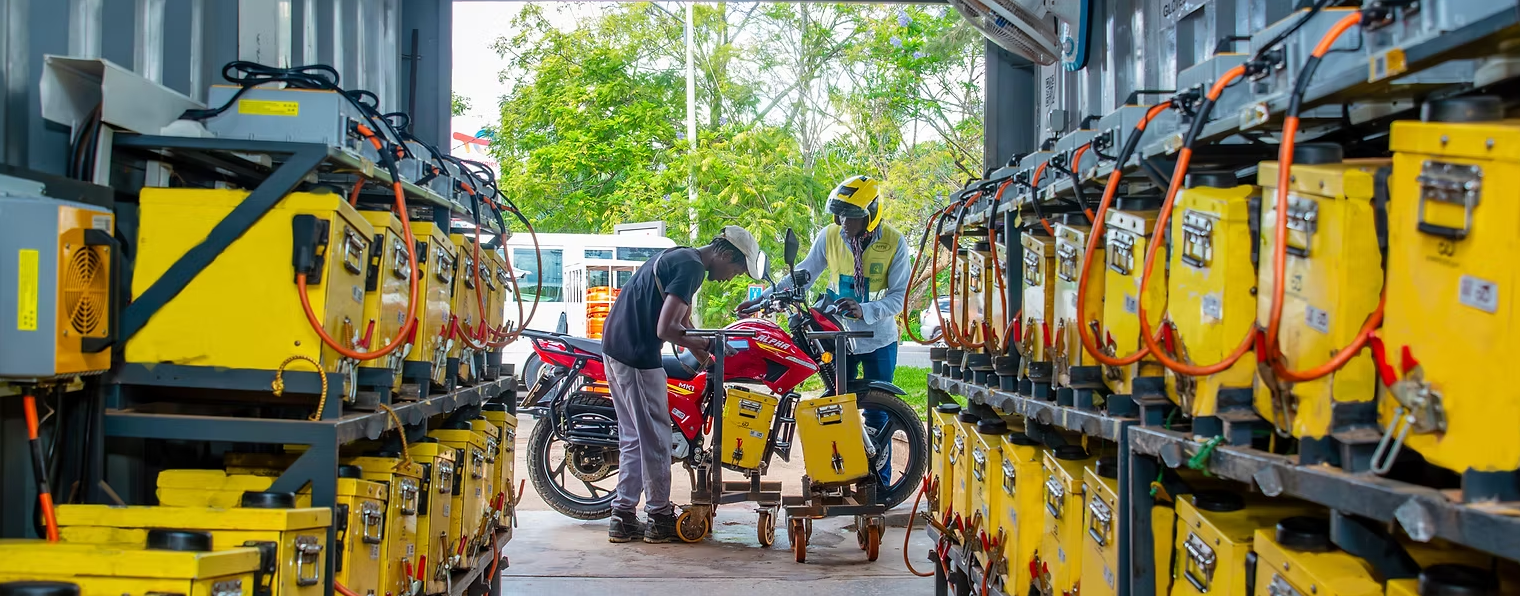Why we invested in Ampersand
By Guilhem Dupuy, Partner at Gaia Impact
The Challenge
Africa’s transportation sector faces a triple crisis. The continent’s growing urban populations rely heavily on motorcycle taxis, known as boda bodas in East Africa, for daily transportation of commuters and income generation for urban youth. Yet this vital sector is confronted with economic inefficiencies, macroeconomic challenges, and an increasing environmental cost.
Motorcycle taxis drivers incur high operational costs. In Rwanda, for instance, boda boda drivers earn an average 15$ per day, out of which 11$ is spent on fuel, maintenance and vehicle leasing costs. For most drivers, the cost of their motorcycles represents the biggest daily expense, significantly limiting their take home pay to unsustainable levels. The scope of the challenge is systemic in Africa, with an estimated 30m motorcycles in circulation, out of which 90% are used commercially.
The macroeconomics of transportation has been draining public finances for decades. In most African countries, the transportation sector relies mostly on imported fossil fuels. Outsized exposure to global oil markets leads to increased vulnerability to inflationary shocks. Simultaneously, oil imports, often priced in foreign currencies, widen trade deficits and exert downward pressure on local exchange rates, increasing currency depreciation risks. Many African economies already face structural trade imbalances, so a heavy oil import bill can worsen the balance of payments, leading to external debt accumulation.
The third challenge is environmental. Traditional petrol-powered motorcycles contribute significantly to urban air pollution and carbon emissions, while the continent’s rapid urbanization only intensifies these challenges. The IEA estimates that the transportation sector is the first source of GHG emissions on the African continent, with a staggering 42% of total emissions, against 24% globally.
At Gaia Impact, we are convinced that social and environmental impact correlates with economic growth. With electric mobility solutions, Africa has a unique opportunity to address economic and environmental challenges while putting money back in the pockets of its youth and its governments.
The solution
The electric mobility sector has historically focused on electric 2-wheelers, solving key pain points (upfront cost and range anxiety) by implementing battery swapping solutions. Battery swapping at dedicated stations is a convenient and affordable way to fast-forward adoption of electric mobility solution, as it substantially decreases total cost of ownership while ensuring a smooth daily experience for drivers. Ampersand has been the first company to deploy a city-wide battery swapping network in Kigali, Rwanda, offering a unified user experience and robust motorbikes able to climb up the hilly slopes of Kigali. After Rwanda, where Ampersand’s main assembly line is still located, the company expanded to Nairobi, Kenya.
The company’s integrated approach combines several key innovations: proprietary heavy-duty battery packs specifically designed for African conditions, purpose-built electric motorcycles that match internal combustion engine bike performance, dense network of battery swap stations designed to enable faster refueling than traditional petrol stations. The user-centric technology stack is orchestrated by an AI-enabled fleet and battery management system optimizing battery lifespan through predictive maintenance, and ensuring smooth user experience at any time and place.
The company has achieved remarkable scale with over 6,000 e-motorcycles powered, 20,000 daily battery swaps, and 400 million+ kilometers driven by its clients. Economically, Ampersand is on the brink of achieving what used to be a pipe dream in the renewable energy sector only a few years ago – turning batteries into fully bankable assets, with predictable useful life and long-tailed residual value.
The impact
This integrated approach delivers compelling user economics: Ampersand’s e-motorcycles cost the same as petrol motorcycles to purchase and finance, but cost 30-40% less to power and more than 50% less to service. By switching to Ampersand, drivers can increase their take-home pay by up to 45%. This massive improvement directly addresses the poverty trap that numerous boda boda drivers are facing. As each boda boda driver supports an estimated 4 additional persons (average between Rwanda and Kenya), increased revenue means better healthcare and education opportunities for their families.
From an environmental perspective, Ampersand’s network has contributed to avoid 14,000 tons of CO2 emissions to date. Each electric motorcycle eliminates approximately 2.3 tons of CO2 annually while reducing urban air pollution that affects millions of city dwellers. As the company scales, this environmental impact will compound significantly.
The broader economic implications are equally promising. By plugging into domestic energy systems, largely renewable in Rwanda and Kenya, electric motorbikes reduce dependence on imported fossil fuels, thus strengthening local economies, balancing trade deficits, preserving currency reserves and reducing risk of inflationary shocks and currency devaluation cycles. At scale, electric mobility has the potential to completely re-write African nations’ economic destiny.
The company’s success demonstrates African leadership in the global electric vehicle transition, positioning East Africa as an innovation hub. Practically, Ampersand paves the way for replicable models: with 99% of batteries still active after 18 months and a customer revenue retention rate of over 100%, Ampersand now works with 7 motorcycle brands developing vehicles to use Ampersand’s energy solution. Petrol station companies are also acting: 2 of them have already invested in Ampersand and feature Ampersand swapping station on their premises.
For Gaia Impact, Ampersand represents a flawless crystallization of our investment thesis: a technology-driven solution that address critical social and environmental challenges while delivering strong financial returns. It also exemplifies a long-held belief of our team, that African solutions can lead global innovation in sustainable technologies, by scaling African-specific technologies towards global relevance.
Learn more about the transaction on Ampersand’s website.

